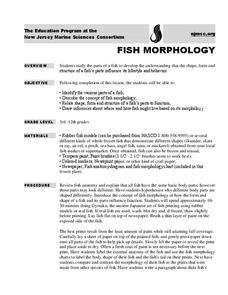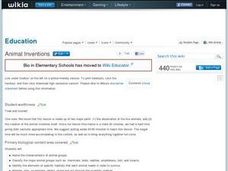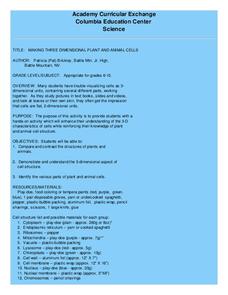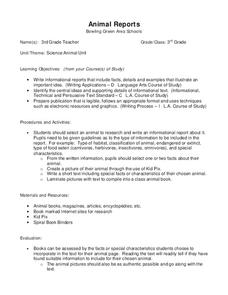Consortium for Ocean Science Exploration and Engagement (COSEE)
Fish Morphology
Life comes in all different shapes and sizes, and fish are no exception. Here, young scientists create fish prints as they learn how specific characteristics allow different species to survive in their particular habitats.
Alabama Wildlife Federation
Fill the Bill
A hummingbird isn't the only bird with a unique beak. After a discussion about the specific characteristics of bird beaks, pupils complete a station rotation and use different tools to simulate the function of different beaks. They...
National Wildlife Federation
Life in the Cold: Climate Challenges
What does it take to make it in the Arctic? Learners examine the cold weather adaptations of a polar bear that help it survive. With everyday objects, they model these characteristics as they become make-shift polar bears. Modeling helps...
National Wildlife Federation
Call of the Wild: Grades 5-8
Teach animal lovers how to decipher frog speak. Classes learn about the different calls using audio clips. They then imitate the calls as a group and make a recording. The challenge is to try to recognize individual sounds—can they do it?
Curated OER
Animal Inventions
Students name the characteristics of animal groups. Students classify the major animal groups such as: mammals, birds, reptiles, amphibians, fish, and insects. They identify the elements of specific habitats that each animal needs in...
Curated OER
Making Three Dimensional Plant and Animal Cells
Learners use a hands-on activity which enhance their understanding of the 3-D characteristics of cells while reinforcing their knowledge of plant and animal cell structure.
Curated OER
Animal Classification
Second graders identify characteristics of and group animals by the five categories of vertebrates.
Curated OER
Animal Categories
Students sort animal picture cards into classification groups such as mammals, reptiles, amphibians, insects and fish. They discuss the characteristics that each group of animals shares then arrange the pictures into a clasificatioon...
Curated OER
Local Animal Sort
Young scholars examine the concepts of sorting and classifying animal. They use familiar animals to determine the connections between physical characteristics and categorization.
Curated OER
All Ears for Adaptation
Students discuss different characteristics that enable animals to adapt to their environments. They work in pairs with one partner standing about one foot behind the other partner and cup their hands around their ears with palms forward....
Curated OER
Animal Reports
Third graders choose an animal to research and write a report about. They determine the animals' habitat, animal classification, whether it is endangered or extinct, and the type of food it eats. Also, they add any special...
Curated OER
Animals Galore
A well-designed instructional activity which covers the characteristics of the animals found in the six animal groups is here for your young biologists. In it, learners divide up into six groups; the amphibians, reptiles, mammals, birds,...
Curated OER
Artificial Selection
The second lesson in the series begins with a starter activity discussing wild versus domesticated animals. Then, scholars play a card game, with optional variations, to emphasize artificial selection. Next, they attend a field trip to a...
Curated OER
Animal Characteristics
Students investigate the characteristics of animals by creating a chart. In this animal life lesson, students create a KWL chart listing all the different animals a class can name. Students take a field trip to a science facility to get...
Curated OER
Animal Classifications
While short, this resource could be used as an overview of amphibians. The presentation lists the characteristics of amphibians and provides several examples. For use in a classroom, a teacher could add information.
Curated OER
Animal Classification
Students are introduced to the concept of classification as it relates to objects, information, and characteristics. In this classification lesson, students research a variety of animals. Students study the Linnaeus's system of...
Curated OER
Animal Alphabet
Second graders identify animals with each letter of the alphabet. In groups, they create a PowerPoint presentation which shows the information they have collected about each one. Using all of this information, they create an animal...
Curated OER
What is an Animal?
In this animal classification worksheet, high schoolers will review the characteristics used in classifying animals including the development of animals. Students will compare the endoderm, ectoderm, and mesoderm. This worksheet has 4...
Curated OER
2nd Grade - Act. 25: Creature Creation
Create a creature using some of the characteristics of a real animal. Second graders will read a book from the "Froggy," series by Johnathan London to learn about the characteristics of frogs. After discussing and recording various...
Curated OER
Classification/Taxonomy/Statistics Review
"Does King Phillip Cry Over Flimsy Grass Stems?" You might not answer that question with this exhaustive worksheet, but your biology class will get the full scoop on the hierarchy of biological classification with this resource. It...
Berkshire Museum
Camouflage!: Collecting Data and Concealing Color
Help young scholars see the important role camouflage plays in the survival of animals with a fun science lesson. Starting with an outdoor activity, children take on the role of hungry birds as they search for worms represented by...
Curated OER
Feeding Frenzy
Young biologists take a look at the myriad of ways that animals increase their chances of surviving in the wild. The adaptations help animals hide, hunt, and attract a mate. This lesson specifically explores how insect mouth parts are...
Pace University
Grade 6-8 Living Things
What characterizes a living thing? Scholars explore the concept during a differentiated instruction unit on living things. They perform lab experiments to determine how animals adapt to stimuli, watch videos and learn about...
Curated OER
Animal Relationships
Students study energy pyramids, food chains and food webs. In this animal relationships lesson students complete several activities and play a game.
Other popular searches
- Characteristics of Animals
- 9 Characteristics of Animals
- Characteristics of Animalia
- Animals Characteristics
- Animal Phyla Characteristics
- Animal Plant Characteristics

























